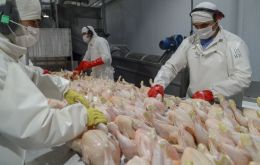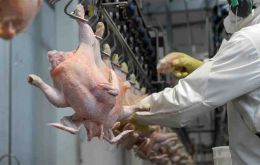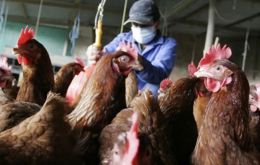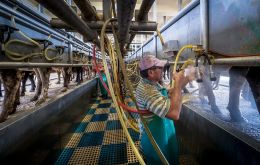MercoPress. South Atlantic News Agency
Tag: Avian flu
-
Monday, November 17th 2025 - 21:16 UTC
Avian flu decimates seal elephant population in South Georgia; few survivors emerge in Uruguayan beaches

In the last few months there have been at least twenty incidents of elephant seals emerging along Uruguayan beaches, both females and males, and allegedly they belong to “deep South species”, according to local environmental and animal protection organizations such as “FaunaMarinaSOS”.
-
Monday, August 25th 2025 - 21:14 UTC
Chile halts poultry imports from Argentina due to avian flu

Chile's Agricultural and Livestock Service (SAG) has ordered the temporary suspension of chicken imports from Argentina due to an outbreak of “highly pathogenic avian influenza” (HPAI) at a commercial poultry facility in the neighboring country.
-
Wednesday, August 20th 2025 - 22:06 UTC
Argentina partially halts poultry exports due to avian flu

Argentina's National Service for Agrifood Health and Quality (Senasa) temporarily suspended poultry exports on Wednesday to countries with which it has a disease-free health agreement following a confirmed case of highly pathogenic avian influenza (HPAI) H5.
-
Friday, July 11th 2025 - 19:37 UTC
Brazil maneuvering to resume chicken exports to Europe

Brazil's Agriculture Minister Carlos Fávaro held a videoconference with EU Commissioner for Health and Animal Welfare, Olivér Várhelyi, this week to discuss lifting restrictions on the Brazilian chicken meat exports imposed after an outbreak of Highly Pathogenic Avian Influenza (HPAI) at a commercial farm in Montenegro, Río Grande do Sul, in May.
-
Wednesday, May 28th 2025 - 10:51 UTC
Bird flu outbreak in Río Grande do Sul contained, says Brazilian minister

Brazil's Agriculture Minister, Carlos Fávaro, announced Tuesday during a public hearing at the Senate Committee on Agriculture and Agrarian Reform that the bird flu outbreak in Montenegro, Rio Grande do Sul, has been successfully contained. The country's health system quickly implemented measures, including inspections of 540 nearby rural establishments and setting up sanitary barriers.
-
Tuesday, May 20th 2025 - 10:38 UTC
Other countries stop buying chicken meat from Brazil

Mexico, Chile, and Uruguay have joined China, the European Union, and Argentina in temporarily suspending chicken imports from Brazil due to an outbreak of highly pathogenic avian influenza (HPAI) detected on a commercial farm in Montenegro, Rio Grande do Sul, Brazil’s third-largest chicken-producing state.
-
Monday, May 19th 2025 - 10:30 UTC
Uruguay to assess avian flu outbreak for possible additional precautions

Uruguayan authorities will be convening Monday to decide which steps to take in the face of an avian flu outbreak in Brazil's Rio Grande do Sul. Montevideo has already issued an alert, urging producers to strengthen biosecurity measures.
-
Saturday, May 17th 2025 - 04:59 UTC
Paraguay on alert over avian flu outbreak in neighboring Brazil

Paraguay's National Service of Animal Quality and Health (Senacsa) issued Friday a sanitary alert, urging officials, producers, and citizens to report sick or dead birds and avoid handling them to prevent disease spread. The measure was adopted after Brazil confirmed its first outbreak of Highly Pathogenic Avian Influenza (HPAI) in a commercial poultry farm in Rio Grande do Sul.
-
Wednesday, February 19th 2025 - 08:42 UTC
Uruguay on avian flu alert after detection in Argentina

Uruguay's Ministry of Livestock, Agriculture and Fisheries (MGAP) declared a state of health alert due to an outbreak of avian influenza in Tres Isletas, in the Argentine province of Chaco, it was reported Tuesday in Montevideo. The measure seeks to protect public health and national poultry production as the malady poses risks to biodiversity, the poultry sector, and public health. It can cause sudden bird mortality, respiratory and neurological symptoms, hemorrhages, and diarrhea, it was also explained.
-
Friday, November 29th 2024 - 08:22 UTC
US CDC calls for more testing of dairy workers given the spread of avian flu

United States health officials have called for more testing of employees on farms with bird flu after a new study showed that some dairy workers had signs of infection, even when they didn’t report feeling sick.
